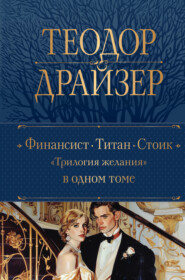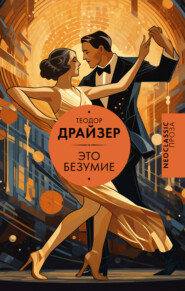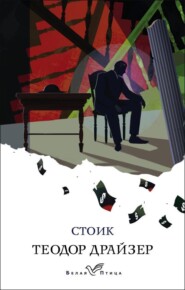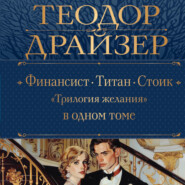По всем вопросам обращайтесь на: info@litportal.ru
(©) 2003-2024.
✖
Sister Carrie / Сестра Кэрри. Книга для чтения на английском языке
Настройки чтения
Размер шрифта
Высота строк
Поля
It went this way on every occasion. Drouet did not leave her much alone. She had time for some lone wanderings, but mostly he filled her hours with sight-seeing. At Carson, Pirie’s he bought her a nice skirt and shirt waist. With his money she purchased the little necessaries of toilet, until at last she looked quite another maiden. The mirror convinced her of a few things which she had long believed. She was pretty, yes, indeed! How nice her hat set, and weren’t her eyes pretty. She caught her little red lip with her teeth and felt her first thrill of power. Drouet was so good.
They went to see “The Mikado” one evening, an opera which was hilariously popular at that time. Before going, they made off for the Windsor dinning-room, which was in Dearborn Street, a considerable distance from Carrie’s room. It was blowing up cold, and out of her window Carrie could see the western sky, still pink with the fading light, but steely blue at the top where it met the darkness. A long, thin cloud of pink hung in midair, shaped like some island in a far-off sea. Somehow the swaying of some dead branches of trees across the way brought back the picture with which she was familiar when she looked from their front window in December days at home.
She paused and wrung her little hands.
“What’s the matter?” said Drouet.
“Oh, I don’t know,” she said, her lip trembling.
He sensed something, and slipped his arm over her shoulder, patting her arm.
“Come on,” he said gently, “you’re all right.”
She turned to slip on her jacket.
“Better wear that boa about your throat to-night.”
They walked north on Wabash to Adams Street and then west. They dined and went to the theatre. That spectacle pleased Carrie immensely. The color and grace of it caught her eye. She had vain imaginings about place and power, about far-off lands and magnificent people. When it was over, the clatter of coaches and the throng of fine ladies made her stare.
“Wait a minute,” said Drouet, holding her back in the showy foyer where ladies and gentlemen were moving in a social crush, skirts rustling, lace-covered heads nodding, white teeth showing through parted lips. “Let’s see.”
“Sixty-seven,” the coach-caller was saying, his voice lifted in a sort of euphonious cry. “Sixty-seven.”
“Isn’t it fine?” said Carrie.
“Great,” said Drouet. He was as much affected by this show of finery and gayety as she. He pressed her arm warmly. Once she looked up, her even teeth glistening through her smiling lips, her eyes alight. As they were moving out he whispered down to her, “You look lovely!” They were right where the coach-caller was swinging open a coach-door and ushering in two ladies.
“You stick to me and we’ll have a coach[34 - You stick to me and we’ll have a coach. – Держитесь за меня и у нас будет свой экипаж],” laughed Drouet.
Carrie scarcely heard, her head was so full of the swirl of life.
They stopped in at a restaurant for a little after-theater lunch.
Now the lunch went off with considerable warmth. Under the influence of the varied occurrences, the fine, invisible passion which was emanating from Drouet, the food, the still unusual luxury, she relaxed and heard with open ears. She was again the victim of the city’s hypnotic influence.
“Well,” said Drouet at last, “we had better be going.”
They had been dawdling over the dishes[35 - They had been dawdling over the dishes. – Они уже давно сидели над пустыми тарелками.], and their eyes had frequently met. Carrie could not help but feel the vibration of force which followed, which, indeed, was his gaze. He had a way of touching her hand in explanation, as if to impress a fact upon her. He touched it now as he spoke of going.
They arose and went out into the street. The down-town section was now bare, save for a few whistling strollers, a few owl cars, a few open resorts whose windows were still bright. Out Wabash Avenue they strolled, Drouet still pouring forth his volume of small information. He had Carrie’s arm in his, and held it closely as he explained. Once in a while, after some witticism, he would look down, and his eyes would meet hers. At last they came to the steps, and Carrie stood up on the first one, her head now coming even with his own. He took her hand and held it genially. He looked steadily at her as she glanced about, warmly musing.
A week or so later Drouet strolled into Fitzgerald and Moy’s, spruce in dress and manner.
“Hello, Charley,” said Hurstwood, looking out from his office door.
Drouet strolled over and looked in upon the manger at his desk.
“When do you go out on the road again?” he inquired.
“Pretty soon,” said Drouet.
“Haven’t seen much of you this trip,” said Hurstwood.
“Well, I’ve been busy,” said Drouet.
They talked some few minutes on general topics.
“Say,” said Drouet, as if struck by a sudden idea, “I want you to come out some evening.”
“Out where?” inquired Hurstwood.
“Out to my house, of course,” said Drouet smiling.
Hurstwood looked up quizzically, the least suggestion of a smile hovering about his lips. He studied the face of Drouet in his wise way, and then with the demeanour of a gentlemen, said: “Certainly; glad to.”
“We’ll have a nice game of euchre[36 - game of euchre – юкер (род карточной игры)].”
“May I bring a nice little bottle of Sec[37 - Sec – (фр.) сухой (о вине)]?” asked Hurstwood.
“Certainly,” said Drouet. “I’ll introduce you.”
Chapter IX
Convention’S Own Tinder-Box: The Eye that is Green
Hurstwood’s residence on the North Side, near Lincoln Park, was a brick building of a very popular type then, a three-story affair with the first floor sunk a very little below the level of the street. It had a large bay window bulging out from the second floor, and was graced in front by a small grassy plot, twenty-five feet wide and ten feet deep. There was also a small rear yard, walled in by the fences of the neighbours and holding a stable where he kept his horse and trap.
The ten rooms of the house were occupied by himself, his wife Julia, and his son and daughter, George, Jr., and Jessica. There were besides these a maid-servant, represented from time to time by girls of various extraction, for Mrs. Hurstwood was not always easy to please.
“George, I let Mary go yesterday,” was not an unfrequent salutation at the dinner table.
“All right,” was his only reply. He had long since wearied of discussing the rancorous subject.
There was a time when he had been considerably enamoured of his Jessica, especially when he was younger and more confined in his success. Now, however, in her seventeenth year, Jessica had developed a certain amount of reserve and independence which was not inviting to the richest form of parental devotion. She was in the high school, and had notions of life which were decidedly those of a patrician. She liked nice clothes and urged for them constantly. Thoughts of love and elegant individual establishments were running in her head. She met girls at the high school whose parents were truly rich and whose fathers had standing locally as partners or owners of solid businesses. These girls gave themselves the airs befitting the thriving domestic establishments from whence they issued. They were the only ones of the school about whom Jessica concerned herself.
Young Hurstwood, Jr., was in his twentieth year, and was already connected in a promising capacity with a large real estate firm. He contributed nothing for the domestic expenses of the family, but was thought to be saving his money to invest in real estate. He had some ability, considerable vanity, and a love of pleasure that had not, as yet, infringed upon his duties, whatever they were. He came in and went out, pursuing his own plans and fancies, addressing a few words to his mother occasionally, relating some little incident to his father, but for the most part confining himself to those generalities with which most conversation concerns itself. He was not laying bare his desires for any one to see. He did not find any one in the house who particularly cared to see.
Mrs. Hurstwood was the type of woman who has ever endeavoured to shine and has been more or less chagrined at the evidences of superior capability in this direction elsewhere.
The atmosphere which such personalities would create must be apparent to all. It worked out in a thousand little conversations, all of which were of the same calibre.
“I’m going up to Fox Lake to-morrow,” announced George, Jr., at the dinner table one Friday evening.
“What’s going on up there?” queried Mrs. Hurstwood.
“Eddie Fahrway’s got a new steam launch[38 - steam launch – паровая яхта], and he wants me to come up and see how it works.”
“How much did it cost him?” asked his mother.
They went to see “The Mikado” one evening, an opera which was hilariously popular at that time. Before going, they made off for the Windsor dinning-room, which was in Dearborn Street, a considerable distance from Carrie’s room. It was blowing up cold, and out of her window Carrie could see the western sky, still pink with the fading light, but steely blue at the top where it met the darkness. A long, thin cloud of pink hung in midair, shaped like some island in a far-off sea. Somehow the swaying of some dead branches of trees across the way brought back the picture with which she was familiar when she looked from their front window in December days at home.
She paused and wrung her little hands.
“What’s the matter?” said Drouet.
“Oh, I don’t know,” she said, her lip trembling.
He sensed something, and slipped his arm over her shoulder, patting her arm.
“Come on,” he said gently, “you’re all right.”
She turned to slip on her jacket.
“Better wear that boa about your throat to-night.”
They walked north on Wabash to Adams Street and then west. They dined and went to the theatre. That spectacle pleased Carrie immensely. The color and grace of it caught her eye. She had vain imaginings about place and power, about far-off lands and magnificent people. When it was over, the clatter of coaches and the throng of fine ladies made her stare.
“Wait a minute,” said Drouet, holding her back in the showy foyer where ladies and gentlemen were moving in a social crush, skirts rustling, lace-covered heads nodding, white teeth showing through parted lips. “Let’s see.”
“Sixty-seven,” the coach-caller was saying, his voice lifted in a sort of euphonious cry. “Sixty-seven.”
“Isn’t it fine?” said Carrie.
“Great,” said Drouet. He was as much affected by this show of finery and gayety as she. He pressed her arm warmly. Once she looked up, her even teeth glistening through her smiling lips, her eyes alight. As they were moving out he whispered down to her, “You look lovely!” They were right where the coach-caller was swinging open a coach-door and ushering in two ladies.
“You stick to me and we’ll have a coach[34 - You stick to me and we’ll have a coach. – Держитесь за меня и у нас будет свой экипаж],” laughed Drouet.
Carrie scarcely heard, her head was so full of the swirl of life.
They stopped in at a restaurant for a little after-theater lunch.
Now the lunch went off with considerable warmth. Under the influence of the varied occurrences, the fine, invisible passion which was emanating from Drouet, the food, the still unusual luxury, she relaxed and heard with open ears. She was again the victim of the city’s hypnotic influence.
“Well,” said Drouet at last, “we had better be going.”
They had been dawdling over the dishes[35 - They had been dawdling over the dishes. – Они уже давно сидели над пустыми тарелками.], and their eyes had frequently met. Carrie could not help but feel the vibration of force which followed, which, indeed, was his gaze. He had a way of touching her hand in explanation, as if to impress a fact upon her. He touched it now as he spoke of going.
They arose and went out into the street. The down-town section was now bare, save for a few whistling strollers, a few owl cars, a few open resorts whose windows were still bright. Out Wabash Avenue they strolled, Drouet still pouring forth his volume of small information. He had Carrie’s arm in his, and held it closely as he explained. Once in a while, after some witticism, he would look down, and his eyes would meet hers. At last they came to the steps, and Carrie stood up on the first one, her head now coming even with his own. He took her hand and held it genially. He looked steadily at her as she glanced about, warmly musing.
A week or so later Drouet strolled into Fitzgerald and Moy’s, spruce in dress and manner.
“Hello, Charley,” said Hurstwood, looking out from his office door.
Drouet strolled over and looked in upon the manger at his desk.
“When do you go out on the road again?” he inquired.
“Pretty soon,” said Drouet.
“Haven’t seen much of you this trip,” said Hurstwood.
“Well, I’ve been busy,” said Drouet.
They talked some few minutes on general topics.
“Say,” said Drouet, as if struck by a sudden idea, “I want you to come out some evening.”
“Out where?” inquired Hurstwood.
“Out to my house, of course,” said Drouet smiling.
Hurstwood looked up quizzically, the least suggestion of a smile hovering about his lips. He studied the face of Drouet in his wise way, and then with the demeanour of a gentlemen, said: “Certainly; glad to.”
“We’ll have a nice game of euchre[36 - game of euchre – юкер (род карточной игры)].”
“May I bring a nice little bottle of Sec[37 - Sec – (фр.) сухой (о вине)]?” asked Hurstwood.
“Certainly,” said Drouet. “I’ll introduce you.”
Chapter IX
Convention’S Own Tinder-Box: The Eye that is Green
Hurstwood’s residence on the North Side, near Lincoln Park, was a brick building of a very popular type then, a three-story affair with the first floor sunk a very little below the level of the street. It had a large bay window bulging out from the second floor, and was graced in front by a small grassy plot, twenty-five feet wide and ten feet deep. There was also a small rear yard, walled in by the fences of the neighbours and holding a stable where he kept his horse and trap.
The ten rooms of the house were occupied by himself, his wife Julia, and his son and daughter, George, Jr., and Jessica. There were besides these a maid-servant, represented from time to time by girls of various extraction, for Mrs. Hurstwood was not always easy to please.
“George, I let Mary go yesterday,” was not an unfrequent salutation at the dinner table.
“All right,” was his only reply. He had long since wearied of discussing the rancorous subject.
There was a time when he had been considerably enamoured of his Jessica, especially when he was younger and more confined in his success. Now, however, in her seventeenth year, Jessica had developed a certain amount of reserve and independence which was not inviting to the richest form of parental devotion. She was in the high school, and had notions of life which were decidedly those of a patrician. She liked nice clothes and urged for them constantly. Thoughts of love and elegant individual establishments were running in her head. She met girls at the high school whose parents were truly rich and whose fathers had standing locally as partners or owners of solid businesses. These girls gave themselves the airs befitting the thriving domestic establishments from whence they issued. They were the only ones of the school about whom Jessica concerned herself.
Young Hurstwood, Jr., was in his twentieth year, and was already connected in a promising capacity with a large real estate firm. He contributed nothing for the domestic expenses of the family, but was thought to be saving his money to invest in real estate. He had some ability, considerable vanity, and a love of pleasure that had not, as yet, infringed upon his duties, whatever they were. He came in and went out, pursuing his own plans and fancies, addressing a few words to his mother occasionally, relating some little incident to his father, but for the most part confining himself to those generalities with which most conversation concerns itself. He was not laying bare his desires for any one to see. He did not find any one in the house who particularly cared to see.
Mrs. Hurstwood was the type of woman who has ever endeavoured to shine and has been more or less chagrined at the evidences of superior capability in this direction elsewhere.
The atmosphere which such personalities would create must be apparent to all. It worked out in a thousand little conversations, all of which were of the same calibre.
“I’m going up to Fox Lake to-morrow,” announced George, Jr., at the dinner table one Friday evening.
“What’s going on up there?” queried Mrs. Hurstwood.
“Eddie Fahrway’s got a new steam launch[38 - steam launch – паровая яхта], and he wants me to come up and see how it works.”
“How much did it cost him?” asked his mother.

















